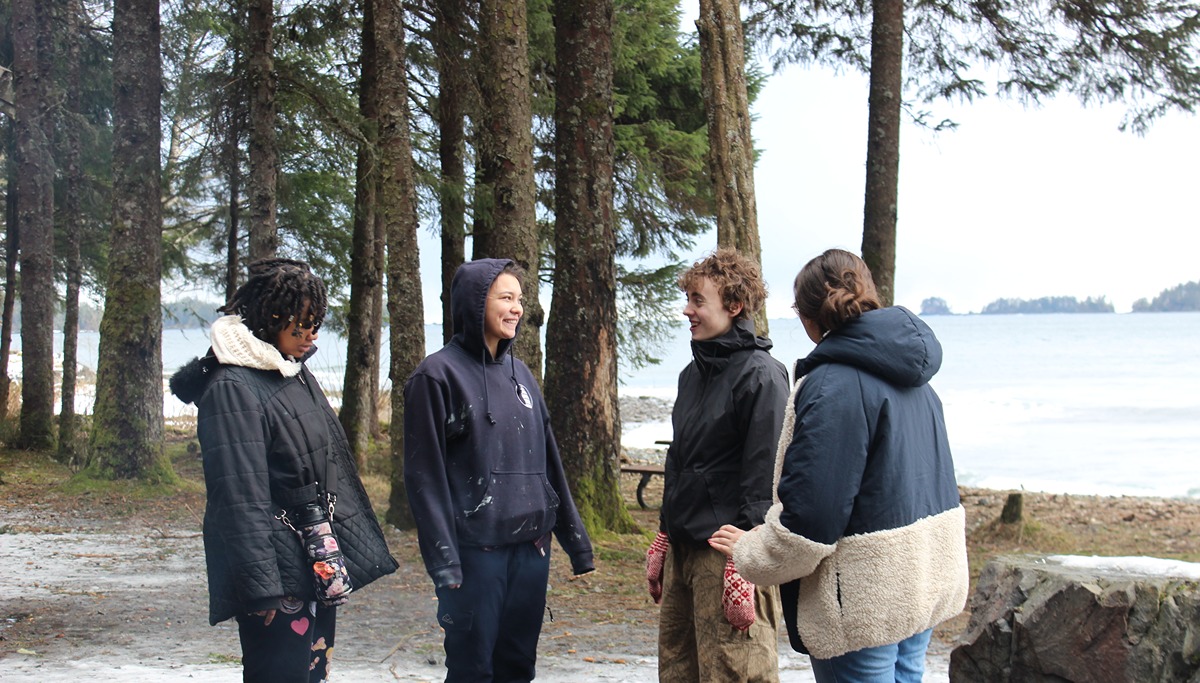A Day in the Life of an Outer Coast Student
By Mell Sommer (Outer Coast Year 2023-2024, Undergraduate Program 2024-2026)
Thick snowflakes paint the forest behind your window. The sound of your alarm wakes you, and you turn it off quickly, turning towards the peaceful view outside. You revel in the silence, hearing only the soft sounds of the forest swaying behind the glass. It’s 8:00 am in the morning and none of your peers are up yet, which means no slamming doors or chitter chatter in the hallway. Fortunately, there are no classes on Friday mornings, which means everyone has the chance to catch up on some well-needed sleep today.
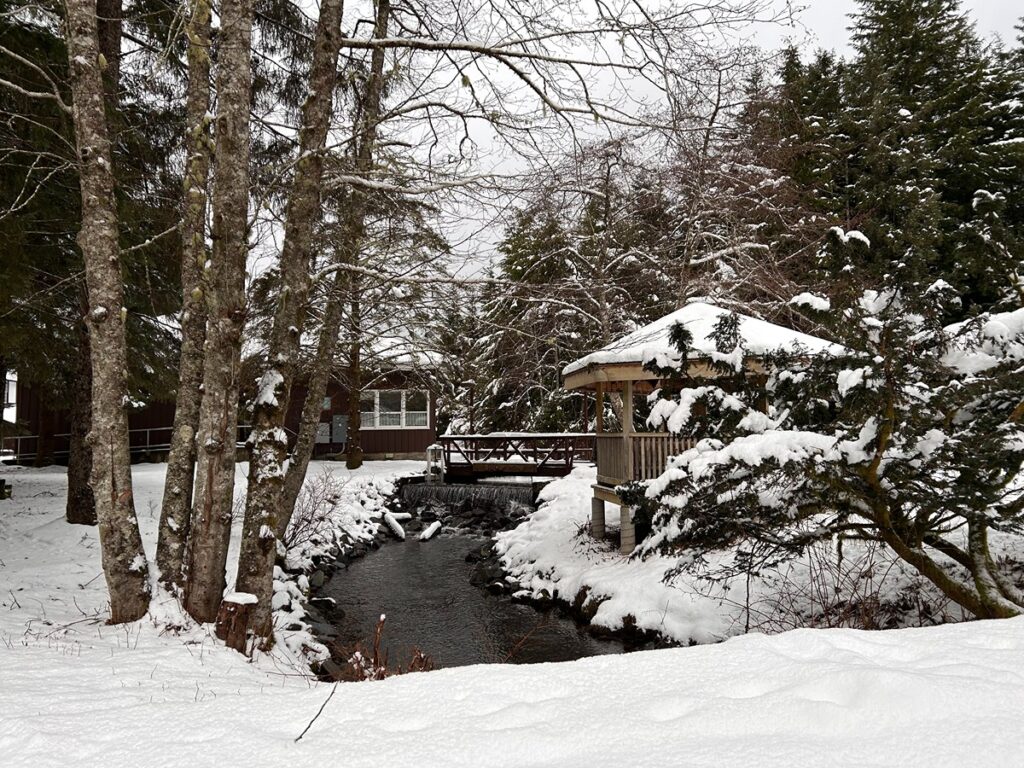
You’re up early today to take a walk with Adam Haar Horowitz, a visiting neuroscientist who studies dreams. You’ve been hoping to spend some one-on-one time with him and finally, you were able to fit a walk into both of your schedules. With a slight pep in your step, you head down the hall towards the kitchen. Your feet excitingly guide you towards the fridge as you remember that the grocery team has just gone to the grocery store. Yes! Finally, the cream cheese has been restocked! You make a delicious cinnamon raisin bagel and do a quick inventory of the freezer. You were chosen by the Student Body to keep an inventory of the kitchen to reduce waste and make grocery trips smoother. It looks like the kitchen is running low on frozen fruit, so you write a message on the whiteboard to remind the grocery team to add this item into the budget for next week’s run.
Feeling full and ready for the day ahead of you, you make your way towards the Yawffice. The Yawffice, which is essentially just the school office, is where you can find all of the staffulty (how Outer Coast refers to staff and faculty) throughout the day. Upon entering, you are greeted by Outer Coast’s staffulty, and, as per usual, their welcome puts a big smile on your face. In anticipation of a chilly walk with Adam, you make yourself a cup of tea by the door. Out of habit, you do a quick check of their fridge for expired items as the water boils. No surprise! The milk is expired… by two months. They all laugh and thank you for letting them know. You leave the Yawffice along with Adam, wondering if they will ever buy new milk.
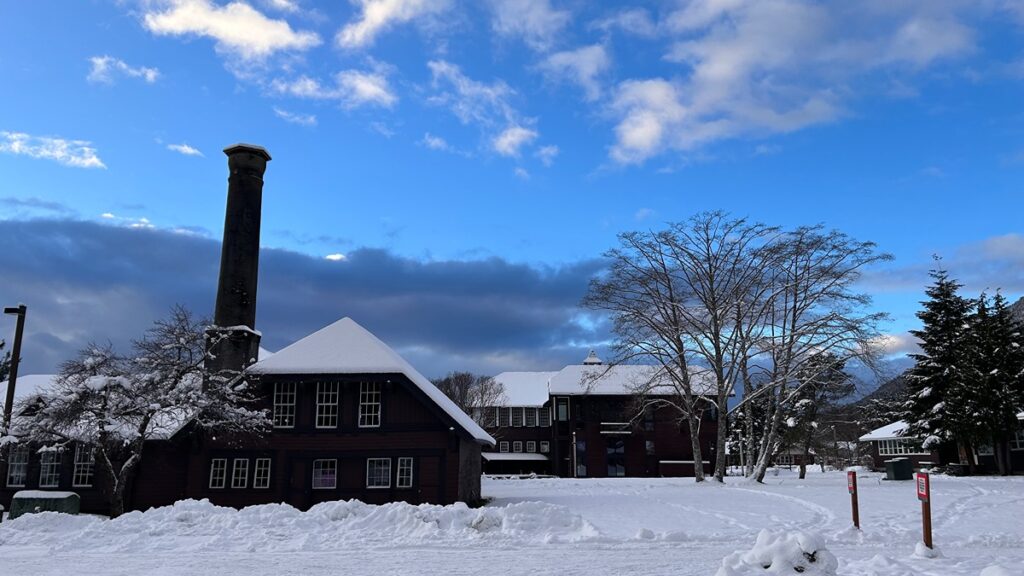
Outside, some ravens are rolling down the snowy rooftops. “Ravens are always up to something…maybe I’ll write my next ecology paper on the unique patterns of behavior in ravens,” you say out loud. Being quite a silly and excitable guy, Adam immediately lights up, “Ah! That reminds me, you mentioned that you are interested in pursuing ecology?” he says. Being immersed in the rich and abundant environment in Sitka has planted a growing seed of wonder inside of you, and you have been considering studying ecology as a long-term goal for your education. You and Adam end up having a long conversation about what being an ecologist would be like. He tells you about the kind of research he is doing, and how he ended up in the neuroscience field, which helps you get an idea of what college life could look like after Outer Coast. Running your hand along a wooden fence, you feel the snow slowly seep into your wool gloves. Going for walks in Sitka often involves taking breaks from chatting to stop and take in the world around you. The scenery is so awe-inspiring that it leaves you speechless—simply hoping to process what the land and waters around you have to share. It is quite lovely to feel this silent appreciation with a friend.
One of the best places to pause a friendly conversation is at the sea walk lookout, beginning at the end of Totem Park, where you and Adam stop. This section of the boardwalk has just been built, so the smell of the freshly placed yellow cedar is still sharply pungent. In the distance, you can see Mount Edgecumbe, the magnificent volcano that frames many views of the sea. Today, Mount Edgecumbe is completely covered in snow, causing it to almost blend into the cloudy morning sky. Both you and Adam look out at the volcano in silence as the sounds of the ocean take hold of your minds. It’s peaceful outside, and the ocean crashes below your feet. Listening closely, you can almost hear the sound of the snow disappearing into the face of the ocean.
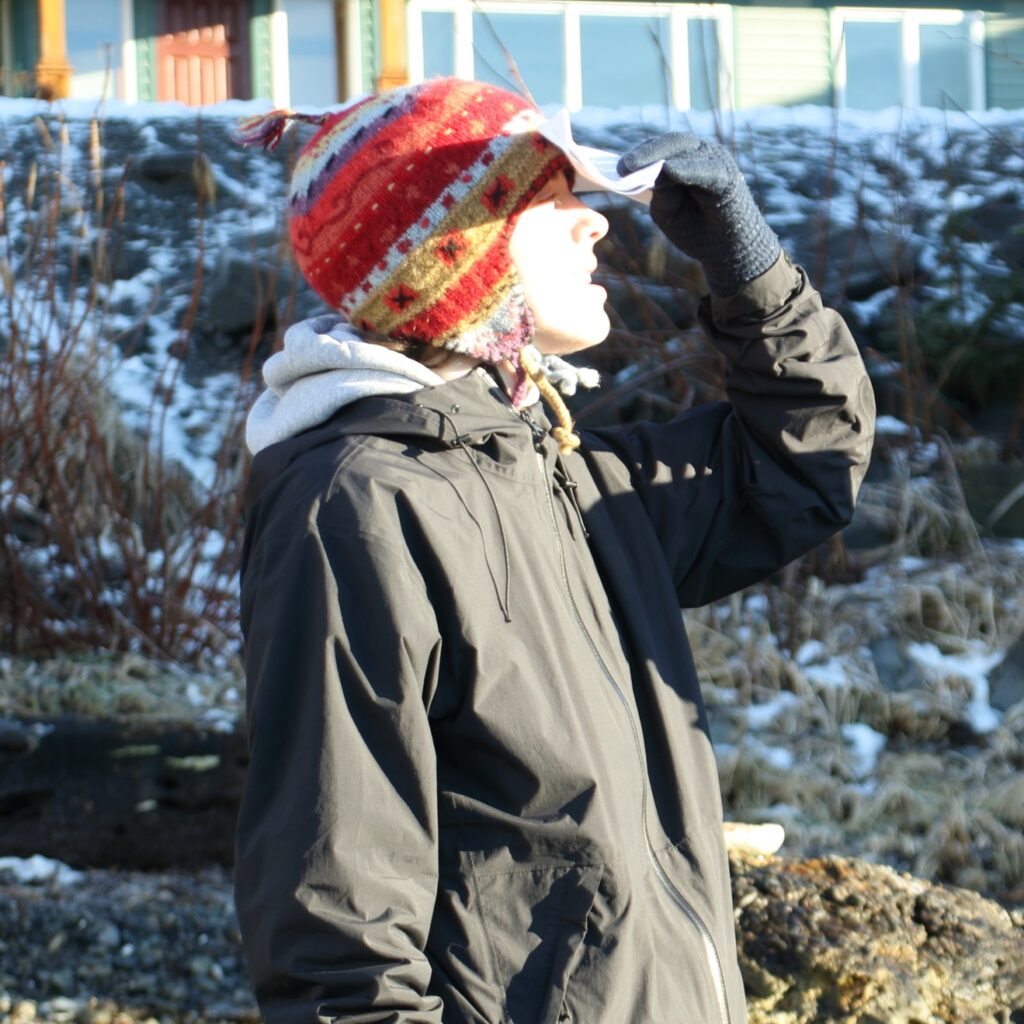
Time has run its course and you and Adam make your way back to campus. You still have a little over an hour until lunchtime, so you spend this free time reading your copy of Braiding Sweetgrass: Indigenous Wisdom, Scientific Knowledge, and the Teachings of Plants by Robin Wall Kimmerer. Texting the student group chat, you say, “Hey guys, I’m reading in the student lounge if anybody wants to join me.” Tobi and James, two of your good friends, amble over to the lounge. As you read, you come up on a chapter called “Learning the Grammar of Animacy.” The chapter discusses how the English language strictly categorizes objects as animate or inanimate, whereas Potawatomi, Kimmererʼs native language, teaches her how to see connective worldviews that open up the world beyond the tight boundaries of English. She also talks about the significance of reviving Indigenous languages, and how that can help shape and deepen our relationships with the natural world. Here are some of her words you find quite powerful:
“Imagine walking through a richly peopled world, none of whom are human. Birch people, bear people, rock people. Persons who we think of and therefore speak of as beings worthy of our respect, of inclusion in a peopled world. Imagine the access we would have to different perspectives, the things we might see through other eyes, the wisdom that surrounds us. We don’t have to figure out everything by ourselves, there are intelligences other than our own, teachers all around us.” (Kimmerer, 58).
Kimmererʼs text beautifully weaves together the lessons you have learned in both Indigenous Studies and Ecology. Learning Lingít, the native language of the Lingít people, an Indigenous group of the Northwest Coast who have lived in Sitka since time immemorial, has changed your understanding of the world. Walking around Sitka, you try your best to call plants, animals and places by their Lingít names. You know now that they can truly hear you when you speak to them in their language. In the time that you’ve spent living here, you’ve started to feel a profound appreciation for your teachers, not only your professors, but the plants, animals and waters whom you live amongst and learn from.
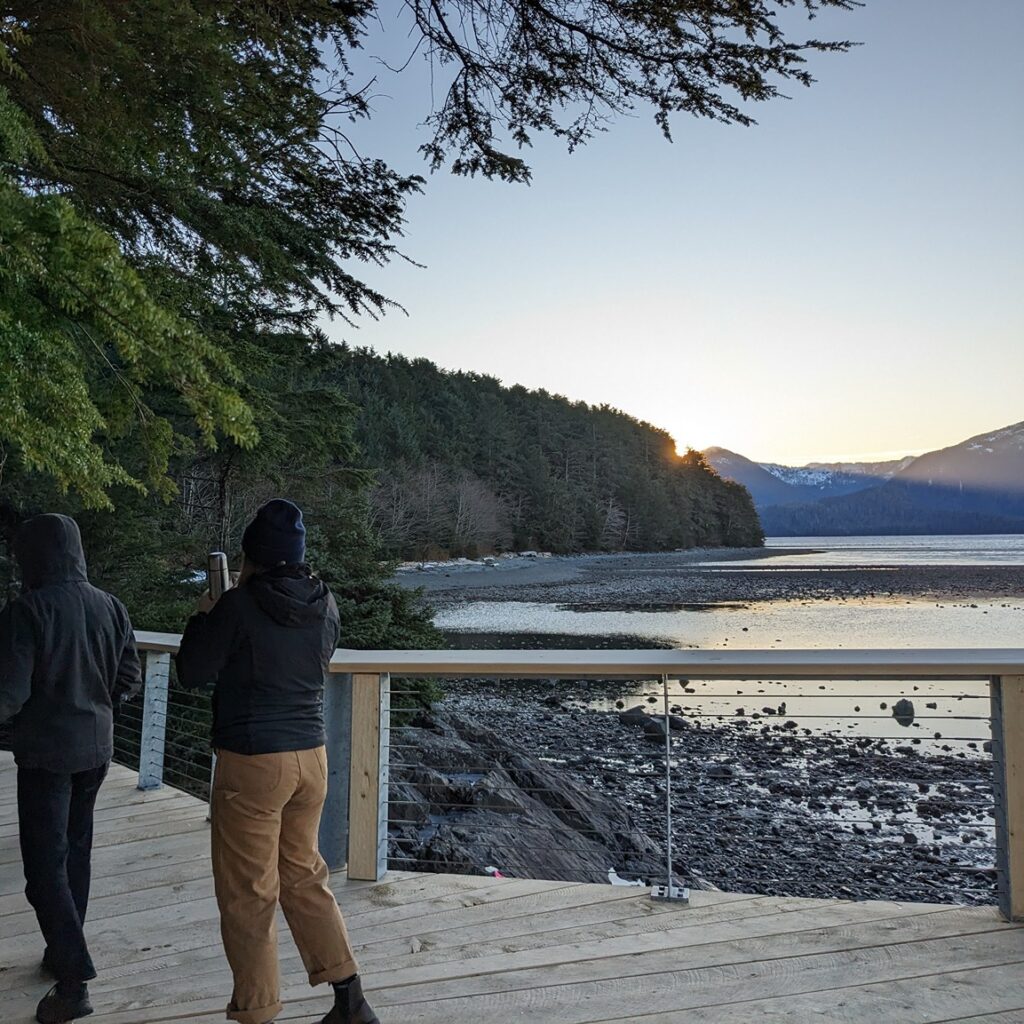
You’re starting to get hungry, and just in time, the familiar and extremely loud song starts to play across Sitka, letting you know that it is noon. In reality, this bell is just a daily test of the tsunami alarm, but to Outer Coast, it’s the lunch signal. Doug, the kind man who cooks lunch and dinner on weekdays, pulls open the cafeteria doors. The smell of grilled cheese sandwiches wafts through the lounge. Itʼs time to close your book. You, James and Tobi make your way to the cafeteria, “Hey Mell!” says Doug. “Hi Doug! Thanks for lunch, it looks great. Oh and sick music today…as always,” you say. Doug is always playing banger classical music in the kitchen and you have gotten some great recommendations from his playlists. After finishing your lunch, you realize that you have become so completely lost in conversation with Caroline Daws, your ecology professor, and Nirali, the dean of students, that you three are the last people left in the cafeteria. Conversations at the lunch table always seem to get a little crazy, often leaving you with a sore stomach (not from the food, but from the intense laughter). Topics of strange overseas adventures and the true meaning of memes have almost made you late to class.
With approximately one minute to make it on time, you dash out the door towards the Yaw building, where all of your classes are held. On Friday afternoons you have a quick fifteen minute Lingít immersion lesson co-taught by Yeidikook’áa, the Chair of Indigenous Studies, and Matthew Spellberg, Dean of Faculty and Chair of Literature. During the lesson, students and teachers can only speak in Lingít. Often this time slot is either spent learning Lingít grammar or having rotating conversations with partners. Then, after Lingít immersion ends, everyone jumps into the art seminar with Yeidikook’áa. Today, you are all working on your beading projects. Art class is always the best place to create gifts for friends, family and community members. Just recently, you made a beaded starfish for Teddy, the night time maintenance man who you’ve become buddies with. Today, you are working on some earrings to send home to your sister. While beading, Yeidikook’áa plays Lingít songs on the speakers and prompts everyone to tap their feet on each skip in the beat. As your threading needle loops through the beads, you make sure to pay extra attention to the songs, because next week, Larry, Yeidikook’áa’s partner, is coming in to teach Lingít dancing, your favorite lesson of all.
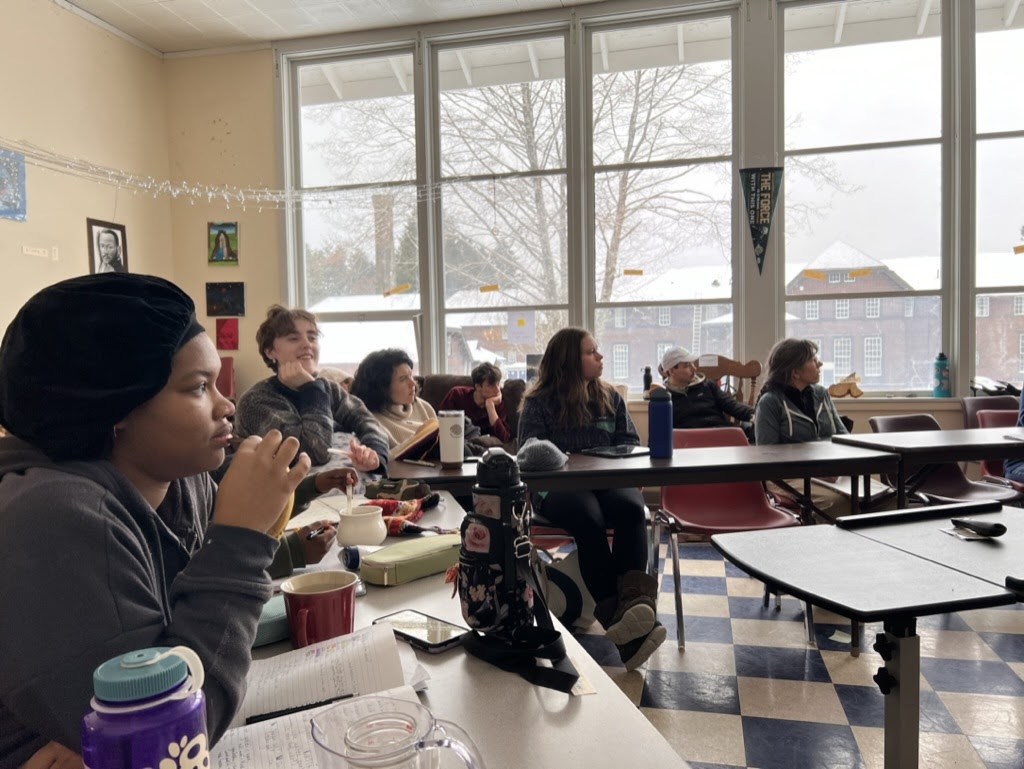
After class, staffulty and students run down towards the ocean. The snow has not stopped all day and the soft white piles covering the earth continue to rise. Today is Nicolly’s birthday, and she has invited everyone down to the water for a polar plunge. Feeling hesitant, you almost back out…the snow is cold, after all. I told her I would do it. I do want to do this with everyone, you think to yourself. Jumping up and down, you muster up the courage for Nicolly because you know it means the world to her. Everyone takes off their coats, warm pants and gloves to run in unison into the freezing cold ocean. Looking around, you notice how everyone’s bodies and faces are tensed up. Even so, everyone is still laughing and having fun. You’re laughing, too.. Quickly, you all hold hands to form a circle…5…4…3…2…1…everyone plunges underwater…“happy birthday Nicolly!!!!” everyone says. You all run as fast as you can out of the water. Back on the shore, a tingly sensation under your skin warms your body. It feels nice. The sensation comes along with feelings of strength and courage, because dipping in the freezing ocean is no easy task. But you did it for Nicolly, and it ended up being one of your favorite memories so far this semester. You did it because you have committed to trying hard things and taking risks with your community, because you are all in it together. You get back from that cold dip, take a hot shower, look out the window in your room, and think, I am so glad that I am here, right now. I wouldn’t rather be anywhere else in the world.
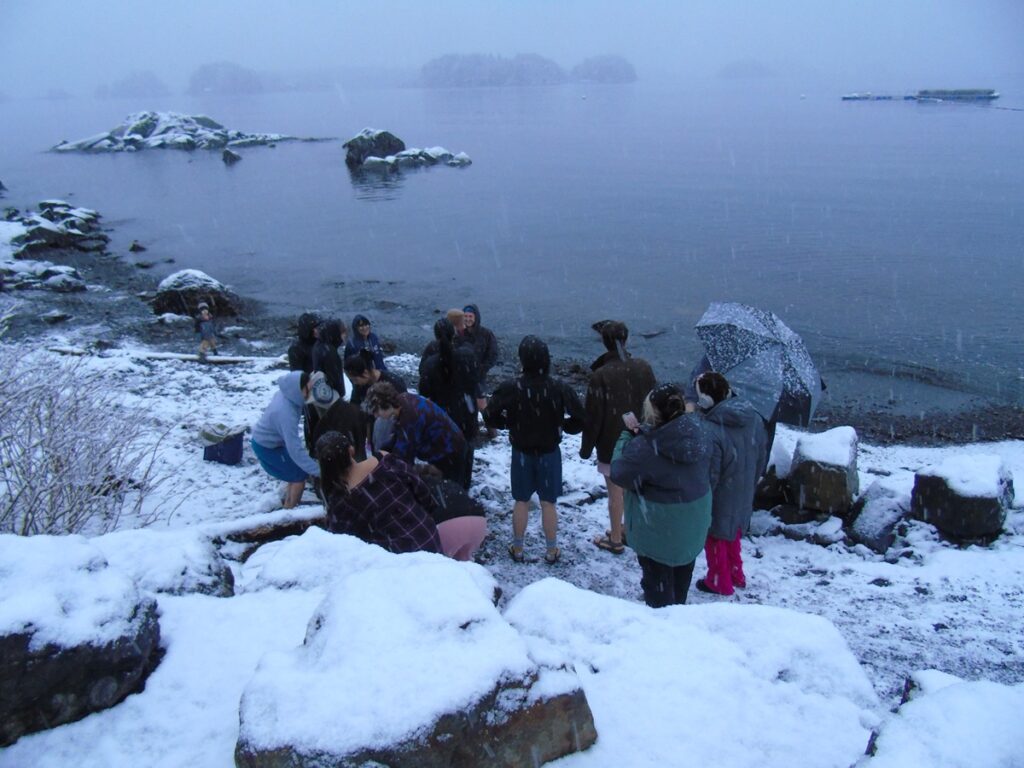
Still, a well-needed break is in order. Sometimes at Outer Coast, such breaks are quite short, so short that they may even be just a few minutes, yet, these little mind breaks are vital in keeping you going throughout the day. Sitting down on your bed, you set an alarm for ten minutes and close your eyes. Then, as if the day was not totally full already, you get up and make your way to Gori’s movie night, where they are screening In the Mood for Love by Wong Kar-Wai. Gori and Yuki are sitting on the couches in the corner. Hmmm, I wonder if anyone else will show up?, you think, feeling a little disappointed at the low turnout. Everyone must be tired after a long week. Not so far into the movie, you fall victim to sleepiness too, and end up missing most of it anyway. Suddenly, the classroom door opens, waking you from a deep sleep. James enters the room with a gigantic bowl of popcorn in hand. He gifts this snack to the three of you and apologizes for not being able to make it. You feel grateful for his kind gesture and enjoy the popcorn. The movie ends right in time for dinner, and you head over to Sweetland with Gori.
CakeComm, a group of students that plan birthday celebrations, is discussing their plans for Tobi’s birthday next week around the cafeteria table. Sitting down with a bowl of soup and cornbread, you twiddle with your spoon…you feel too tired to engage in conversation tonight. Your mind wanders thinking about what a wonderful day you had, and how excited you are to get into your cozy bed and drift off to sleep.
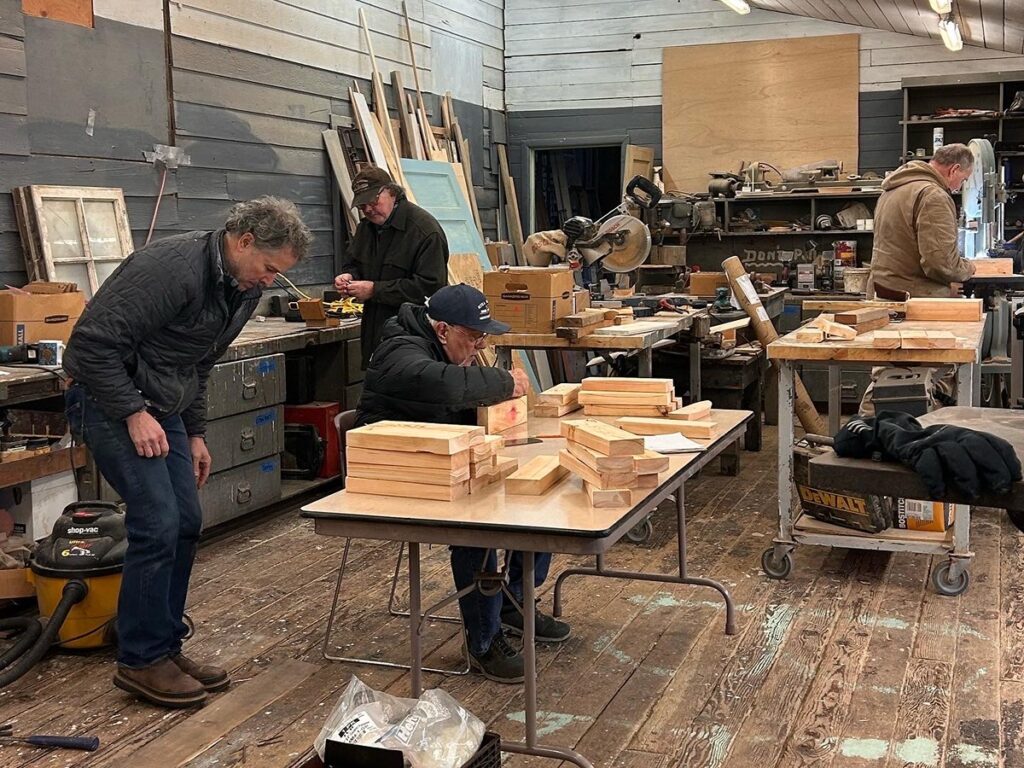
Tomorrow is another early start for you, as you have service at the Japonski Island Boathouse. Every Saturday morning you bike over to the boathouse and meet up with the other volunteers from around Sitka to help restore the old building. The goal is to turn the building into an active boat repair facility and a functioning maritime heritage community center. Each Saturday you make a little bit of progress towards this goal, either by painting doors, sawing through pipes or removing eighty-year-old nails from wood. Building relationships with your fellow volunteers is another type of progress that you care deeply about. The best time to get to know everyone is at break time, when everyone sits in a circle drinking coffee and eating donuts, and conversations drift from boats to murder mysteries and weird diseases. Getting a good night of sleep is an important part of being present around construction, so you always make sure to go to bed early on Fridays. Getting up from the cafeteria, you clean off your plate and wish everyone a good night. After getting ready for bed, you rest your head on your pillow and fall asleep almost instantly.
